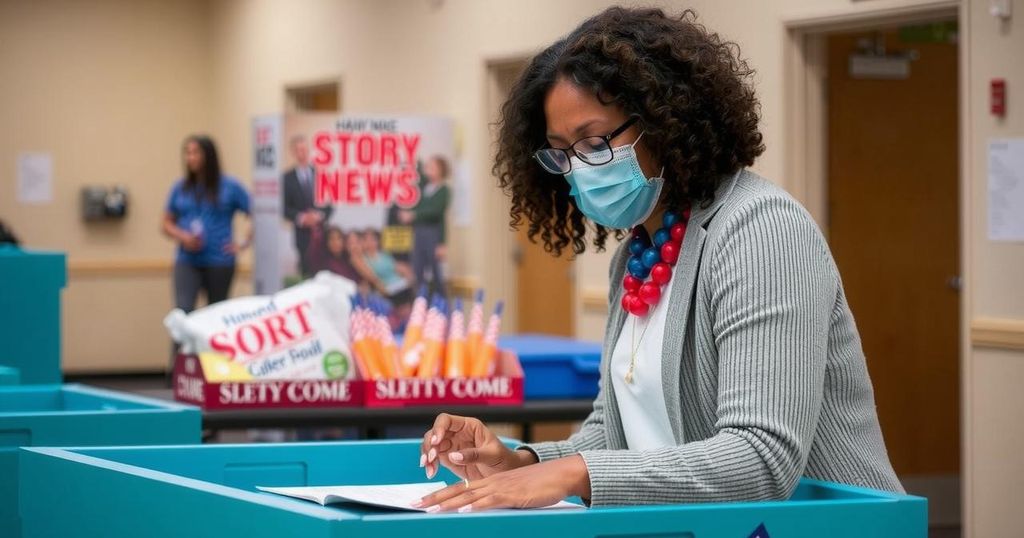Persistent Challenges in Pennsylvania Elections Call for Urgent Reforms
The recent Pennsylvania election proceeded smoothly; however, Lehigh County’s election officials continue facing significant challenges due to staffing shortages and unaddressed requests for election code adjustments. Despite financial support for equipment upgrades, critical changes are still pending, and the political environment presents obstacles to reform. Long wait times and voter frustrations underscore the need for immediate and comprehensive solutions.
ALLENTOWN, Pa. — While the recent Pennsylvania election was conducted without major issues, Lehigh County’s Chief Clerk of Elections, Tim Benyo, highlighted persisting concerns beneath the surface. For several years, both state and county officials have been advocating for adjustments to the election code, such as extended pre-canvassing periods for mail-in ballots and an earlier voter registration deadline. Additionally, the demand for a more comprehensive early, in-person voting system has emerged amidst ongoing political stagnation that has prevented progress on these necessary changes.
Benyo remarked on the resultant impact of stagnant legislative actions, stating, “I do not know how long it is sustainable on the human side of it,” as experienced election staff are departing from their roles. This turnover leaves less experienced personnel to handle more responsibility, amplifying the risk of significant complications during elections. After the challenges faced in tallying the 2020 election results, the state allocated substantial funding to upgrade counting equipment, yet staffing shortages and increasing workloads present new challenges.
Despite expressing appreciation for the financial support, Benyo characterized it as merely a “Band-Aid on a deep wound.” In the immediate lead-up to this year’s election, his team experienced extensive overtime, working around the clock to ensure administrative tasks were completed on time. He noted, “I do not think it is sustainable for offices to have people working 80 hours [of overtime] in a two-week pay period. One hundred sixty hours in two weeks is too much.”
The demand for mail-in ballots surged, leading to unprecedented wait times as voters sought ballots in person. Concurrently, the state’s database, SURE, faced slowdowns under heavy usage, leading to delays in confirming registrations. Tensions arose among voters who were frustrated with the procedures; Benyo recalled instances of heated arguments amid the confusion. In light of these challenges, the election office continues to contemplate alternative solutions gleaned from practices in other states.
As Pennsylvania’s General Assembly reconvenes, the partisan divide remains a significant barrier to potential reforms. Previously introduced legislation aimed at streamlining pre-canvassing efforts was stalled, with partisan disagreements primarily revolving around voter ID laws. Though Representative Michael Schlossberg expressed a slight optimism about the possibility of compromise between the parties, he acknowledged a prevailing fear that progress will continue to be hindered by political maneuvering.
As election officials strive for improvements in the electoral process, the necessity for both immediate remedial measures and long-term legislative changes becomes increasingly urgent. Only with comprehensive dialogue and collaboration between lawmakers can meaningful reforms be enacted to ensure the integrity and efficiency of upcoming elections.
The legislative landscape surrounding Pennsylvania’s elections has been marked by requests for updates to the state’s election code for several years. The significance of these changes stems from the challenges posed during the 2020 election, when lengthy counting and processing times raised concerns about election integrity. Following public frustrations and acknowledgments of staff burnout, officials are advocating for measures that will not only improve the efficiency of election processes but also sustain the workforce tasked with managing them. The upcoming 2025 legislative session serves as a crucial juncture, as elected representatives must navigate their partisan affiliations to address pressing electoral issues.
In summary, the satisfactory execution of Pennsylvania’s recent election masks ongoing concerns about the sustainability of election administration amidst staffing shortages and political gridlock. The urgent need for legislative reforms remains a top priority for election officials, particularly in areas such as mail-in voting processes and timing for ballot handling. As the General Assembly resumes its session, it is crucial that lawmakers prioritize constructive dialogue to address longstanding electoral issues, bridging divides for the benefit of the electoral process and public confidence.
Original Source: www.lehighvalleynews.com




Post Comment